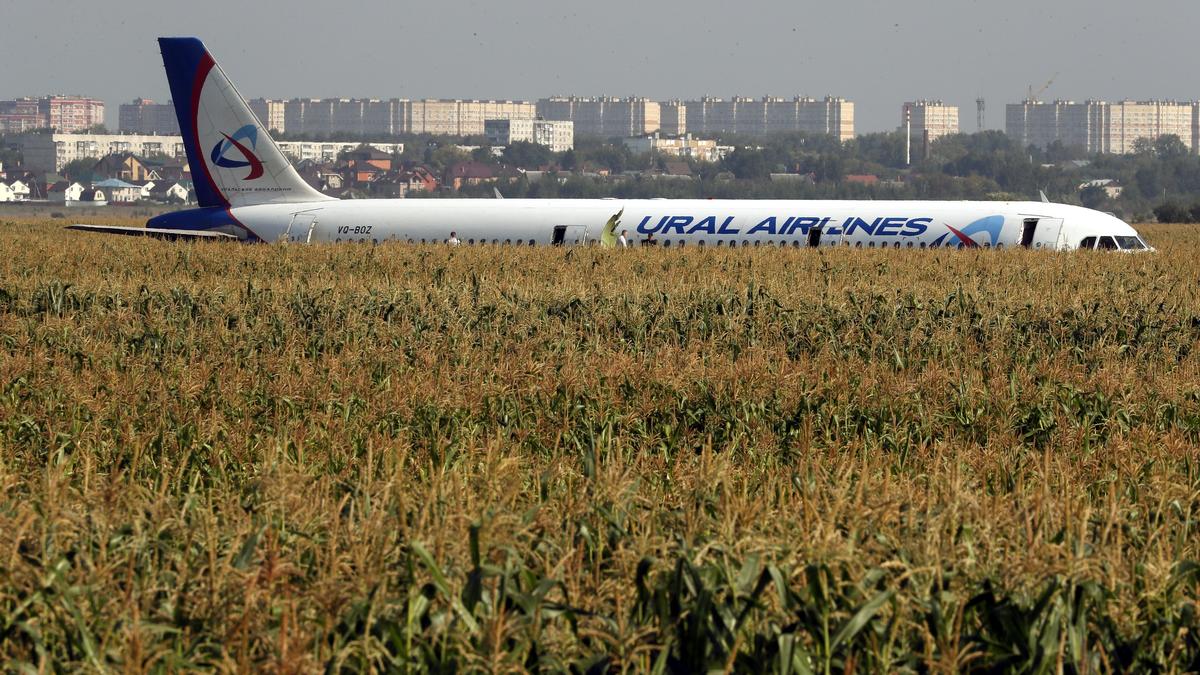Russian aviation has been under unprecedented international sanctions for nearly three years now, with the supply of spare aircraft parts prohibited, and many planes now unable to fly abroad as the foreign leasing companies that owe them are demanding that they be returned.
The number of safety incidents involving passenger planes in Russia so far this year has already surpassed that recorded last year, representing a rise of 30%. Between January and November 2023, there were 161 aviation incidents, while over the same period in 2024 that number has already reached 208.
Industry analysts confirm the correlation between Russian flight safety and the strict international sanctions imposed on the country, and most suggest that Russian commercial flights will ultimately have to cease operation altogether.
There have already been at least 90 cases of passenger aircraft being forced to turn around in midair immediately after takeoff or to make an unscheduled landing after technical issues were detected in flight.
We have limited our study to incidents involving passenger aircraft that took place after takeoff, i.e. cases in which a plane had been deemed flightworthy but an unforeseen incident occurred once the plane was airborne.
Malfunctions identified during technical inspections and checks, including those causing flight delays or requiring aircraft substitutions, were not included in this analysis, as these are considerably more frequent.
The contention that Russian civil aviation is in the grip of a serious crisis is backed up both by open source data and expert opinion.
A year ago, Artyom Korenyako the spokesperson for Rosaviatsia, Russia’s federal air transport agency, described the numerous media reports about the dire state of civil aviation in Russia as a wave of “completely unfounded value judgments”, and claimed that the “allegedly dire state of flight safety” in Russia was not reflected by statistics, pointing to the fact that that the number of aviation incidents recorded in 2023 had been smaller than that recorded the previous year.
However, the contention that Russian civil aviation is in the grip of a serious crisis is backed up both by open source data and expert opinion. For instance, Andrey Patrakov, director of the flight safety think tank RunAvia, suggests that the actual number of Russian civil aviation incidents is higher than either Rosaviatsia’s statistics or even estimates made by journalists, simply as minor incidents are often not added to the official record.
Among the aircraft models most commonly used by Russian airlines, the largest increase in incident rates can be seen in the domestically produced Sukhoi Superjet 100. While the number of safety incidents involving Superjets matched those of Boeings in 2024, there are significantly fewer Superjets in service. Based on Rosaviatsia certificates, the fleets of the 10 largest Russian airlines currently include some 188 Boeings, while they collectively had just 93 Superjets.
In half of cases, in-flight malfunctions in Russia are related to an aircraft’s engines (30%) and landing gear (20%). Other commonly cited sources for technical problems are a plane’s hydraulic system, brakes and navigation system.
Aviation incidents frequently recur in the same aircraft within a relatively short period of time. For instance, when a Sukhoi Superjet 100 caught fire after landing at Turkey’s Antalya Airport on 24 November, it was actually the aircraft’s fourth serious safety incident in the space of three months: in October it had been forced to make an emergency landing after experiencing a hydraulic system failure in mid flight, while in September it had aborted take-off twice and returned to the gate due to technical problems.
In another chilling example, an Airbus operated by Ural Airlines, in which both autopilots failed mid-flight and then the nose wheel steering malfunctioned during landing, was back in operation as usual just one day later.
Aircraft maintenance consists of several elements: spare parts, documentation, and software. Most of all though, airlines constantly require up-to-date information. When an aviation incident occurs, it is normally investigated by the aircraft manufacturer as well as the relevant regulatory authorities. It falls to these agencies to inform global operators of the model of the steps necessary to take to prevent similar issues from occurring in the future. However, Russian airlines have now been cut out of the loop, leaving them to devise their own solutions for avoiding malfunctions. While Russian operators may be able to acquire documentation from other operators of the same aircraft model, the technical specifications even of planes of the same type can differ.
“Russian airlines do not have access to online databases. They try to bypass this by purchasing data on the black market, stealing it, engaging in industrial espionage and so on,” says Alexander Lanetsky, CEO of civil aviation consultancy Friendly Avia Support.
“We see that Western countries are actually reacting quite slowly to this new situation. The export of sanctioned aviation parts to Russia amounts to at least $2–3 billion [€1.9–2.9 billion] annually. But we don’t hear about anyone getting arrested.”
“Aircraft maintenance is difficult because parts are being smuggled in. We suspect this is neither completely reliable nor safe.”
Sometimes arrests are made, however. For instance, in May 2023, two Russian citizens were arrested in the US on suspicion of supplying sanctioned aircraft parts to Russia. Additionally, The New York Times reported that between the imposition of sanctions on Russian airlines and the end of 2022, thousands of crucial aircraft parts worth $14.4 million (€13.7 million) were sent from the US to Russia, including parts produced or registered under the Boeing trademark, totalling $8.9 million (€8.47 million).
“Aircraft maintenance is difficult because parts are being smuggled in. We suspect this is neither completely reliable nor safe. A similar situation occurred in Iran about five years after sanctions were imposed, when planes started crashing one after another. We don’t want anything like that to happen, but sooner or later, unless the situation changes, it becomes a possibility,” Lanetsky said.
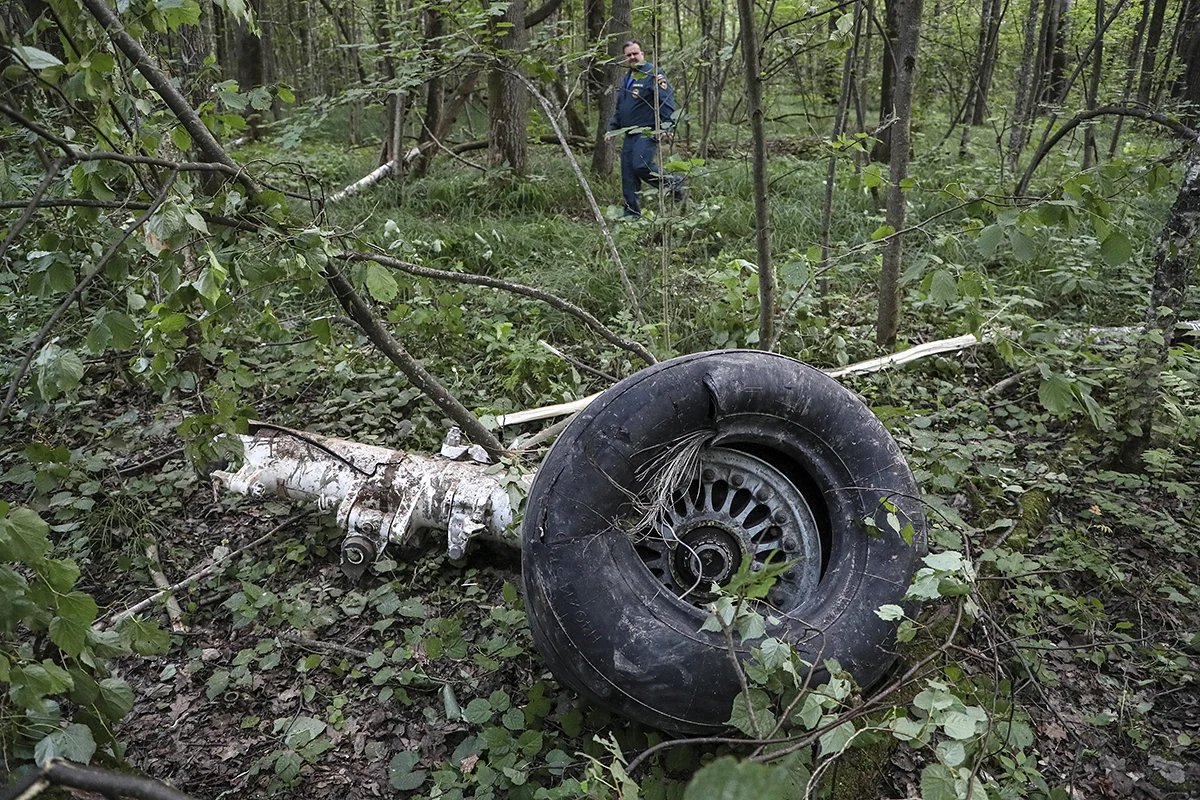
Russian emergency service workers inspect the crash site of a Sukhoi Superjet 100 plane that crashed near the village of Apraksino in the Moscow region, 12 July 2024. Photo: Maxim Shipenkov / EPA-EFE
Are sanctions working?
According to aviation journalist Andrey Menshenin, those charged with authoring the package of sanctions imposed on Russian airlines in 2022 anticipated the difficulty commercial operators would face keeping a fleet of largely foreign-manufactured aircraft flightworthy. As these aircraft, including the Russian-made Sukhoi Superjet, were equipped with foreign components, the authors of the sanctions expected Russia to be forced to take them out of service, as they gradually became unsafe to fly.
“According to this logic, at some point the entire fleet would be grounded, airlines would stop generating profit through taxes, and air travel would cease entirely. Then the Russian people would rise up and overthrow Putin,” Menshenin says. “But what actually happened? Rather than grounding the planes, the airlines found a way to circumvent sanctions by using third country intermediaries.”
“Rather than grounding the planes, airlines found a way to circumvent sanctions by using third country intermediaries.”
Some private commercial companies have seen the current situation as an opportunity to make extra profit, he explains. “As a result, Russian airlines continued to receive original components but ended up spending two to three times more on them than before sanctions.”
Some airlines were forced to close down, but they were mainly smaller ones such as Royal Flight, an airline that had 13 leased Boeing aircraft, 11 of which were seized abroad at the request of leasing companies following the Russian invasion of Ukraine.
Other small airlines have reduced long-haul flights, as the need to bypass Europe complicates routes, increases flight times and raises costs. But Russia’s biggest five airlines, Aeroflot, Pobeda, S7, Ural Airlines and Utair, all continue to operate.
Risky business
“Over the past year there have been discussions, including with European experts, suggesting that sanctions may not be entirely humane, as they increase the risk of incidents for civilian aircraft,” Menshenin said.
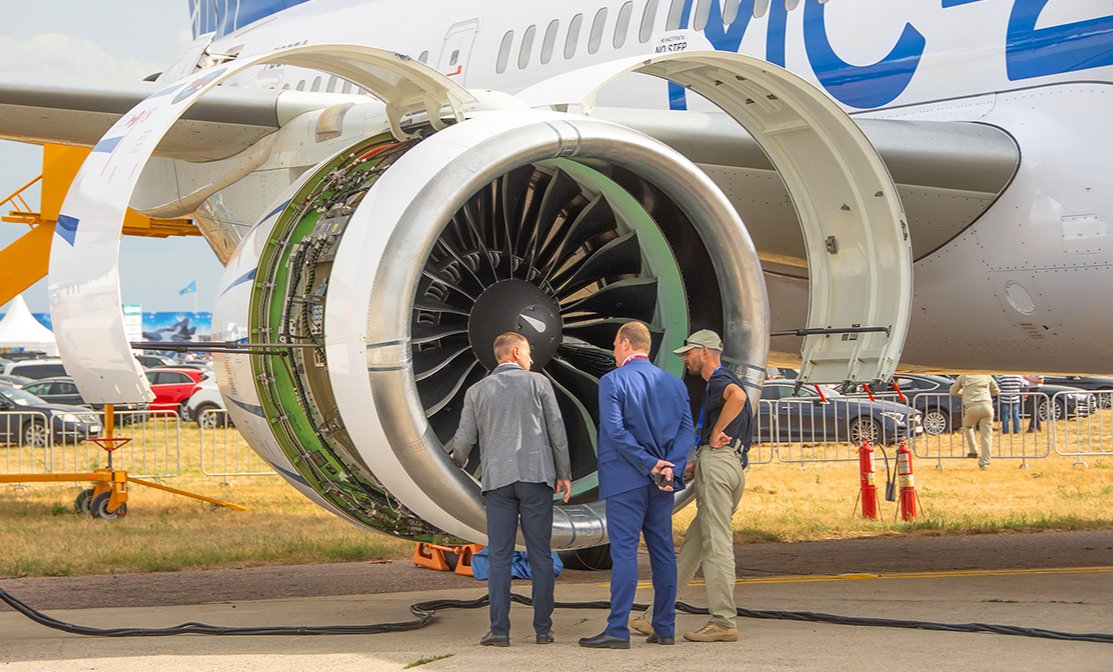
Airport technicians inspect the engine of a new Russian aircraft in Moscow. Photo: Aleksandr Papichev / Alamy / Vida Press
“On the one hand, we understand that Russia is not Iran. It’s a country with a great aviation tradition, a strong engineering school and well-trained pilots. The safety level here is higher than in any Sub-Saharan African country,”Lanetsky says, while noting the negative effect on fight safety caused by sanctions.
However, while it’s normally financial constraints that make African airlines buy low-quality spare parts, Russia is being forced by sanctions to make compromises on the quality of the spare components it buys, Lanetsky points out, as well as in the thoroughness of the safety checks it carries out on its aircraft.
In November, state-affiliated Russian daily Kommersant reported that half of the Airbus A320/A321neos in the fleets of Russian airlines were no longer being used, with 34 of the 66 aircraft of that type currently grounded, a figure backed up by Flightradar data.
“Over the past year there have been discussions, including with European experts, suggesting that sanctions may not be entirely humane, as they increase the risk of incidents for civilian aircraft.”
Russian low-cost airline S7 is currently experiencing the thin edge of the wedge on that front, having been forced to ground 31 of its 39 A320/A321neo aircraft due to them being fitted with engines made by US manufacturer Pratt & Whitney, which cannot be serviced in Russia due to sanctions.
These engines used by the A320/A321neo are the latest models, and therefore are subject to even stricter control by the manufacturer, meaning that all parts are individually numbered and entered into a database, with detailed tracking pinpointing the aircraft in which each spare part is currently being used.
Lanetsky notes that new generation engines for the Airbus neo require repairs practically every year, and only a few companies in the world are licensed to service the engines, none of whom operate in Russia.
“In Europe, this issue also causes planes to be grounded,” Lanetsky explains. “For example, WizzAir may not have grounded every second plane, but 40 of their 200 aircraft were idle throughout the summer. This is a global problem, but in Russia it becomes insurmountable. While WizzAir can suspend an aircraft and place it in line for repair, Russia doesn’t even have the option to replace an engine.”
According to unofficial reports, more than 50 older generation engines were delivered to Russia last year. New generation engines cannot be delivered to Russia due to chips that are embedded in each that detect the aircraft’s location.
Lanetsky predicts that in two years Russian airlines will be forced to stop flying Airbus neos altogether and will have to use other plane models: either older planes that have been smuggled into the country, or Russian planes, which are barely being manufactured at all at present.
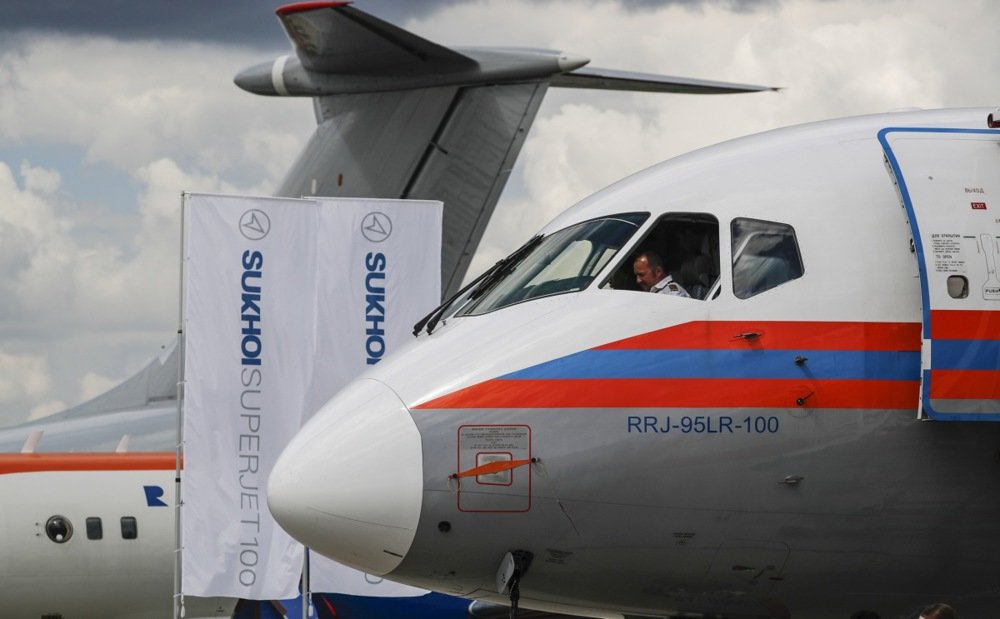
Russian Sukhoi Superjet 100 airplane on display during the Moscow International Aviation and Space Salon, 20 July 2017. Photo: EPA/SERGEI ILNITSKY
Is the Superjet dangerous?
On 24 November the engine of a Superjet owned by Rostov-on-Don-based airline Azimuth caught fire during landing at Antalya airport. All 89 passengers and six crew members were evacuated, with no injuries reported. Azimuth blamed the “rough landing” on what it described as a change in the direction of the wind, though Telegram channel Aviatorishina reported that the incident was in fact caused by a pilot error.
Menshenin says that the situation isn’t “as bad as it seems” and while he accepts that the Superjet has many shortcomings, “some of which are due to its design features”, he stresses that the pilots who fly the Superjet say that its operation is not significantly different from that of the Airbus, by which it was inspired. “The systems are more or less at a modern level, and from a safety perspective, everything is fine.”
While Menshenin says he doesn’t believe that the recent Superjet engine fire incident to be part of a broader trend, he accepts that the risk of emergencies on board is increasing as sanctions force airlines to prolong the interval it permits between performing maintenance checks. As a result, it falls to the skill of the pilot to respond to technical issues in flight, and Menshenin fully accepts that pilot training in Russia had been deteriorating long before the war began.
Will planes in Russia stop flying?
The net result of the international sanctions on Russia since February 2022 is that aircraft may stop flying in Russia altogether.
The Russian civil aviation sector is, according to Lanetsky, currently attempting to follow Iran’s example by introducing so-called “wet leasing”, a process that involves finding an external partner able to provide its own aircraft and crew to fly on domestic or international routes on behalf of Russian airlines.
“The Iranians have been doing this for a very long time, with Ukrainians, Armenians, Tajiks and Kyrgyz flying in their place. Ukraine exported around 100 planes to Iran, I believe, during the ‘darkest times’ when sanctions were in place, not to mention the period when Obama lifted them,” says Lanetsky.
The Russian aviation authority is currently attempting to negotiate similar agreements with Kyrgyzstan, Uzbekistan, Kazakhstan, Qatar, and Kuwait. When Iran followed this approach, the US immediately responded by blacklisting and sanctioning the airlines that worked under this scheme, including Ukrainian ones.
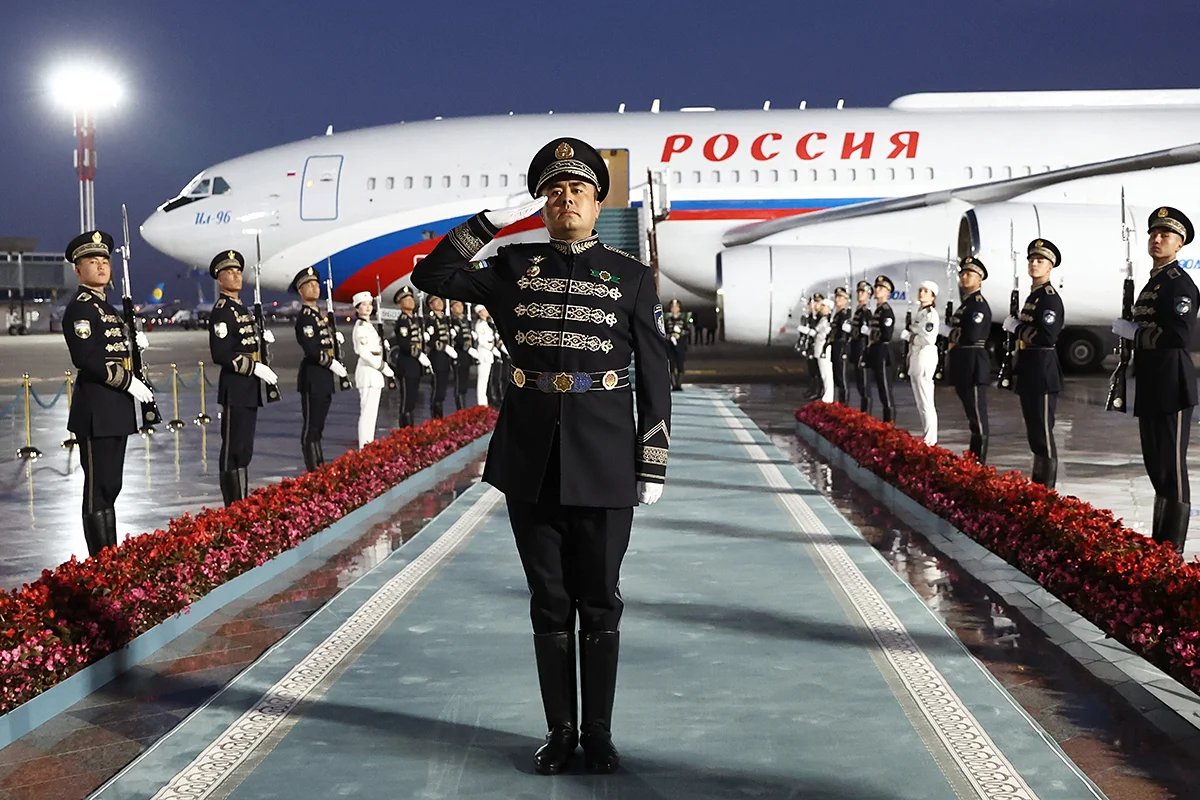
The Russian presidential Ilyushin Il-96 lands in Tashkent, Uzbekistan, 26 May 2024. Photo: Valery Sharifulin / EPA-EFE / SPUTNIK
Russian substitutes?
So can sanctioned components realistically be replaced by Russian-produced alternatives? “This has been the Transport Ministry’s dream since February 2022,” Menshenin says. “The short answer is: no, they can’t. The long answer is yes they can, but it will be difficult, … it’s a question of organisation and financing.”
None of the countries that manufacture these planes do so on their own, Menshenin says. “This is simply because it’s inefficient. There’s no point in developing expertise in all fields simultaneously if you can buy ready-made solutions and save time and money.”
“This idea of isolation and import substitution only exists in the minds of certain imperialists who believe in the concept of a self-sufficient country.”
For example, Airbus is a joint venture between France, Germany, and the United Kingdom, with hundreds of suppliers across dozens of countries worldwide. Boeing also uses components from almost every continent, and it’s worth noting that, despite sanctions, the titanium required to build Boeing aircraft is still being sourced from Russia today.
China also sources the components required for its civil aviation sector from around the world, and while it may eventually attempt to replicate some of them domestically, for now it seems that only a tiny number of components are produced in China, with the rest being purchased from other countries.
“None of the leading manufacturers even set the goal to produce everything domestically. This idea of isolation and import substitution only exists in the minds of certain imperialists who believe in the concept of a self-sufficient country,” Menshenin says, “But in fact no country of this kind exists anywhere in the world.”
Join us in rebuilding Novaya Gazeta Europe
The Russian government has banned independent media. We were forced to leave our country in order to keep doing our job, telling our readers about what is going on Russia, Ukraine and Europe.
We will continue fighting against warfare and dictatorship. We believe that freedom of speech is the most efficient antidote against tyranny. Support us financially to help us fight for peace and freedom.
By clicking the Support button, you agree to the processing of your personal data.
To cancel a regular donation, please write to [email protected]
